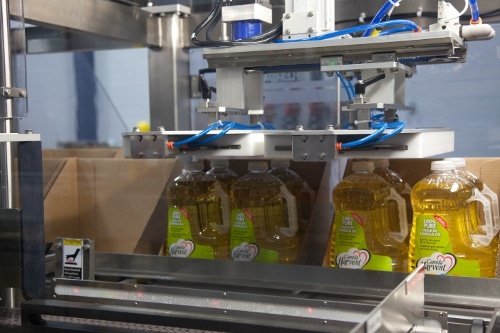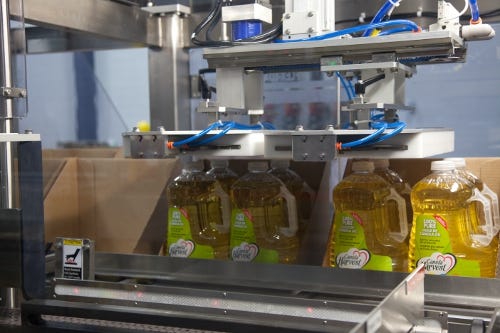January 30, 2014


Richardson
EDITOR'S NOTE: Click here to see a video of Richardson Oilseed's secondary packaging operation.
Cooking oil is big business—few know that better than Richardson Oilseed. The company is a division of Richardson Intl. Ltd., Canada's largest, privately owned agribusiness. Founded more than 150 years ago, the firm has grown to employ more than 1,800 staff across the country and is a worldwide handler and merchandiser of Canadian-grown grains and oilseeds.
Richardson markets its oil under the brand name Canola Harvest at retail and also produces private-labels brands for a variety of retailers. With low saturated fat and zero trans fat, canola oil appeals to consumers looking for more healthful alternatives.
The company packages in a variety of bottle sizes, packed in retail-ready trays and flat pads to facilitate quick stocking, at two state-of-the-art canola processing plants: one in Yorkton, Saskatchewan, and one in Lethbridge, Alberta. Together, these facilities produce more than 1 million metric tons of canola oil each year. Adjacent to the Lethbridge facility is the canola oil packaging plant. There, Richardson Oilseed manufactures and packages a complement of canola-oil based food products such as oil, margarines, shortenings and sprays. Demand for the company's products has increased over the years, moving company officials to consider expansion, adding footprint as well as equipment that could streamline operations. The company approached the team at Delkor Systems to consider its options.
"I started talking with Richardson in mid-2010 about their plans for a new building expansion and, with that, new packaging lines," says Dan Altman, sales manager for Delkor. "The only real concern we had was the weight of the oil bottles. Some of the package weights get up into the 70-lb range and, although from a packaging standpoint we had no issues, our concern was how they would hold up in distribution."
Equipment selection
Richardson Oilseed needed to put in place secondary packaging equipment that kept up with its production pace, provided flexibility and efficiency. According to Shirley Gilmour, director of operations at Richardson Oilseed, the company weighed its options and found the Delkor equipment to be the best fit.
"We decided to purchase from Delkor based on, one, the specification of the equipment available to meet our new packaging design needs; two, the quality of the equipment and design; and, three, price," Gilmour says.
While selecting the equipment that would best fit Richardson Oilseed's requirements, the manufacturer and the processor had intensive discussions and meetings to stay on track.
"The dialogue with Richardson was deep and involved," says Altman. "It required two or three trips to the Lethbridge facility before the order, and two or three trips after. Richardson also came to Delkor once to confirm we all were on the same page in terms of the machinery that we were providing."
The new packaging line includes the following Delkor machines:
• Trayfecta S3 1501 former: This servo former is able to changeover between a tray former, a carton former or a case former, depending on the needs of a particular job.
• Spot-Pak 500 loader: The secondary packaging solution is an automated machine that loads primary product containers onto flat corrugate pads, into four-sided trays or into retail-ready trays. This flexibility allows Richardson Oilseed to provide its customers with their package of choice. The lowest cost Spot-Pak package requires using a temporary bond adhesive to secure the primary package onto the corrugated base pad. Shrink film finalizes the package, providing a low-cost shipper to market. This solution reduces packaging material costs, increases pallet density and reduces dry goods storage.
• Shrink Bundler 25TW: This compact, intermittent-motion shrink machine (designed for any unitized or tray-packed product) is capable of wrapping up to 35 bundles per minute, depending upon product size.
According to Altman, the equipment list helped meet Richardson Oilseed's needs and goals in a number of ways.
"What was initially a solution for Spot-Pak (flat pad package with shrink film) quickly changed to four-sided trays for some products, retail-ready trays for others and pallet trays for some," he says.
Getting up to speed
Altman adds that the company continues to engage Richardson Oilseed to help make sure its new line keeps performing.
"Still to this day, going on one year since installation, I talk to Richardson multiple times per week-the reason is primarily their need to offer new products for their customers, which requires new tooling for the line that we have installed," he says.
In 2012, Richardson Oilseed completed the $15 million expansion to increase the size of its canola packaging plant in Lethbridge by 40 percent and improve efficiencies by fully automating the oil receiving and blending process. Gilmour says while the new line is relatively young yet, it is meeting their expectations.
"Overall, the entire line is running well, although we still have some fine-tuning to do to get the entire line to its full speed and production potential consistently," she says. "The new technology has been a steep learning curve for our operators. However, one of the biggest wins so far-in addition to the tripling of the line speed-has been the reduction in line changeover time from one bottle size to another, which has been reduced by over 50 percent so far."
Altman says one of the reasons why systems like the new Richardson Oilseed line succeed can be boiled down to one word: flexibility.
"Putting in lines with package flexibility is by far the smartest thing you can do," he says. "Customer needs change every day, and having the ability to adapt to those changes puts you in a superior position with your customers."
Delkor Systems, 800-328-5558, www.delkorsystems.com
About the Author(s)
You May Also Like


